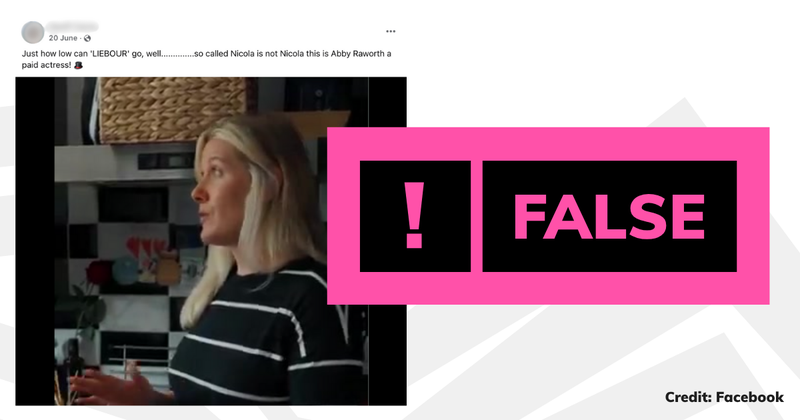Woman falsely linked to viral video involving the PM: How fact checking could have helped
When 31-year-old Abby Raworth first realised her photo and name were being shared online—falsely linked to a viral video involving the Prime Minister—she’d thought it was quite funny.
She assumed it was a mix-up; perhaps she shared a name with the woman in the clip, or maybe someone had simply found her photograph by mistake. But as she dug deeper, she became increasingly uncomfortable with what people online were writing about her and her business (she runs a talent agency representing men’s hairstylists and barbers) “without any regard for if it was correct or not.”
“Well known journalists felt comfortable writing about me and my business for their massive audiences without even sending an email to check,” she said.
Other people—members of the public—were also sending false accusations directly to her inbox. “The number of people who have personally sent me death threats is unbelievable,” she says.
What was the viral post?

In June, Sir Keir Starmer shared a clip on X and Instagram about the government’s expansion of the Warm Home Discount scheme. The clip showed both Mr Starmer and the energy secretary Ed Miliband visiting the Staffordshire home of a blonde woman called Nicola who spoke about the impact of the scheme’s expansion on her bills.
The Prime Minister shared the clip with the caption: “Nicola is a single mother to three children. She works hard to provide for her family, and it is important to me that we help people like her with the cost of living.”
But soon after the clip was published, posts on social media began to claim that the woman in the footage was not really called Nicola, but instead a “paid actress” or “actress and agent” named Abby Raworth. Many of the posts that claimed this shared a screenshot of a profile of a woman by this name, who is also blonde and was listed as an “Artist Agent”.
So, who is Abby—and is the woman really called Nicola?
Abby is not the woman in the video. She made that clear at the time, telling us: “The person in the video with the PM is not me, and I'm not an actress at all.”
The woman in the video is named Nicola and she is a genuine Burton and Uttoxeter constituent whose MP, Jacob Collier, was also present at her home (and can be seen next to her at the start of Mr Starmer's video).

Mr Collier told Full Fact that the interview was “entirely genuine”, and that Nicola agreed to speak with the PM about receiving the Warm Home Discount following the policy’s expansion.
Can you help us do more?
Please donate to Full Fact, improve the information environment, and help more people like Abby.
DonateAbby’s experience
After the video was posted, Abby, who lives in London, had no idea that people online had seized on these claims—and run with them. Some of the posts making the false connection have been viewed thousands of times, and one has racked up a whopping 2.1 million views at the time of writing.
And it wasn’t until one of our fact checkers reached out to her for comment that she realised something slightly odd was happening on social media. She said: “I did have a strange amount of people requesting to view my private social media but I didn’t accept anyone and just ignored it.
“The main platform that it seemed to be spreading around was X which is something I haven’t had since my teenage years. I did have a couple of friends from when I was younger send me a couple of things a week or two in and say ‘I don’t know if you’re aware of this’.
“I could see why someone might look at that image of me and think it might be that woman. But if you’ve known me and met me, you’d know it was nothing like me. We’ve got different eyes, voices, body shapes, walks.”
As for the online commentary and the messages flooding her inbox, one theme stood out: politics—and all of the emotions it stirs up.
“It was shocking to see how personally people took it, how angry they were. I felt sad for them, that this was how they needed to communicate their emotions. I don’t take any of it personally, it’s social media—you can only see what people want you to see. The common denominator was people that really disliked Keir Starmer.” Abby did also point out that plenty of the direct messages (DMs) she received were individuals simply trying to clarify if what was being said online was true.
“Politics is incredibly intricate to any particular person and it’s so different on so many levels that I can see why this motivates people,” she said. “That whole side of it, I don’t really have a comment on it.
“I’m a miniscule part of this. I was advised that the moment you put yourself out there to defend yourself you either become a target or you give something so much more traction that isn’t true so it’s eventually going to die down and go away.
“In this situation, no one has done anything really awful but when you Google my name and my business, what comes up? I don’t want this to be associated with it.”
And on the subject of whether enough is being done to hold people accountable for sharing false or misleading information, Abby said: “That’s the problem in general. You can’t give someone the freedom of speech and then be upset with what they come out with. I think it’s incredibly sad.
“What shocks me is how little people bothered to do regarding checks before they used someone’s name and accused them of something. There is a lack of accountability for what comes out of peoples' mouths and if it had happened to any of those people they would have a different opinion on it.”
Why Full Fact exists
Abby’s experience is a stark example of how misinformation can spread rapidly online, distorting public perception—not just of individuals like Abby, but of politicians and political parties. In an age where false and misleading claims can shape opinions (and even influence how people choose to vote) the need for accurate information has never been more vital.
That is exactly why Full Fact exists: to counter the spread of misinformation and to raise the standard of public debate—for everyone. For Abby, Full Fact’s outreach and subsequent debunking of the claims were “really helpful… it was the only organisation that tried to contact me to see if there was any truth to the claims.”
We’re glad to have played a part in setting the record straight.